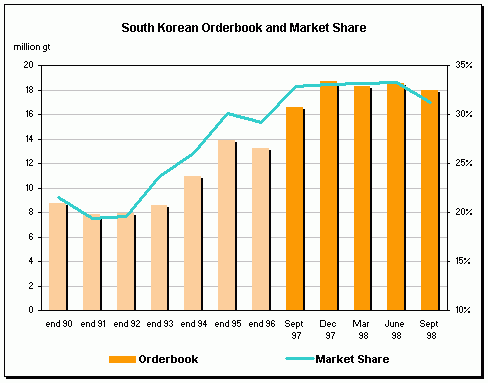| Korea 1998 ended
much better than it began. The Korean yards have again increased their orderbook in
absolute value and maintained their market share.
In November 1997 the country was literally in shock. Bankruptcies threw
about 10,000 people a day onto the streets. The paralysis that blocked the Korean economy
and doubt about the magnitude of the crisis at first rendered the yards incapable of
taking new orders. No order was recorded in January 1998.
This period of uncertainty did not last long, because the Koreans
reacted very quickly under the impetus of their new president. Workers, managers and
directors agreed to make enormous sacrifices in the form of overtime and large salary
reductions.
An equilibrium, still fragile, was achieved in the Spring. Whereas the
exchange rate had increased from about 900 won/$ in November 1997 to almost 2,000 at the
end of 1997, the won stabilized at the end of March and the beginning of April at about
1,400.
With the notable exception of the Halla yards, the large Korean yards
such as Hyundai HI, Daewoo and Samsung did not stop taking orders from that point on, with
Hanjin following them a few months later. It is interesting to note in this context that
the country's orderbook has increased. In 1998 Korea's nominal capacity was thus reduced
for the first time, because of the absence of Halla, without diminishing or affecting the
actual national production capacity, in fact just the contrary.
While prices have already dropped by 15 to 30%, some are wondering about
how important it is for the country to maintain this status quo, insofar as the
reactivation of the Halla yards could contribute to a further fall in prices, to the
detriment of the other yards and the national interest. Time will tell.
The main difficulty has been in setting up down-payment refund
guarantees acceptable to the shipowners and their banks. The bank guarantees issued by
Kexim, the Korean import-export bank, have had to be counter-guaranteed by Western banks
or insured by first-rank insurance companies.
However, this has not always been the case, and some Middle East
shipowners were satisfied with Kexim guarantees. Others found their own financing.
The Korean yards got around the difficulty by, for the first time,
applying payment terms shifted toward delivery, thus facilitating the setting-up of these
counter-guarantees because of the smaller amounts, whereas previously the yards had always
favored installment payments during construction, such as 5 x 20%. This resulted in
additional costs for the yards, as interest rates in Korea were also higher (up to 17%).
At the same time the face value expressed in dollars decreased.
It appeared that a certain level of confidence had been restored in the
Spring, and payments, cash or brought forward towards the signing of the contract, could
be negotiated in order to give the shipowners additional discounts, calculated on the cash
advances thus agreed at very high interest rates. This no doubt once again altered the
market's perception of the prices obtained. Overseas Shipholding Group (OSG) concluded a
contract with Hyundai HI for a VLCC at approximately $65 million on the basis of payments
shifted towards delivery.
The Korean yards thus recorded many more orders than they had initially
estimated.

However, in 1998 they had to face up to the disappearance of their
domestic market. Shipowners such as Hanjin Shipping and Hyundai Merchant Marine, which in
previous years had contributed about one third of the orders placed with the Hanjin and
Hyundai HI yards, were no longer present and all the orders taken were for export.
It is interesting to note that the Korean yards also contributed to
their own success. They did so by deliberately and continuously improving their
productivity. For example, the Daewoo yards announced productivity gains of 24% in 1997.
However, as Daewoo did not set up new production capacity, its productivity gains can be
estimated by the number of ships or the tonnage delivered in recent years: in 1990 Daewoo
delivered 13 ships totaling 1 million gt, while in 1996 it delivered 30 ships totaling
2.25 million gt. Over the same period the number of employees decreased.
The Korean shipbuilders also showed great flexibility in understanding
and implementing shipowner demands, resulting in better quality and greater recognition by
the international community.
There has been much speculation about the future of the Halla and
Daedong shipbuilding yards. Daedong continued to take orders. Two thirds of Halla's debt
was cleared. But the situation of this yard is still blocked and will probably remain so
until complete settlement of its debt.
Despite the drop in prices, the main shipbuilders Hyundai HI, Daewoo,
Samsung, Hanjin and Daedong will post profits for 1998. The South Korean government, under
pressure from the IMF, is pushing the chaebols to reorganize themselves. This
reorganization is already under way in the automotive and electronic industries, but no
movement has yet been observed in shipbuilding.
Although prospects for 1999 are still somber, 1998 finished better than
it began:
- Korea was to repay part of its debt to the IMF in Dec 1998. The Yonhap
agency recently quoted a government source stating that Korea was going to buy dollars
because the won was at about 1,200, judged too high.
- The balance of payments turned around from a deficit of $8.2 billion at
the end of 1997 to a surplus of $40 billion.
- The Seoul stock market rose by 50%.
Moreover, according to the latest estimates, orders in 1998 should
exceed 10 million gt, while the Korean orderbook broke the 20 million gt barrier at the
end of the year. The Hyundai Economic Research Institute forecasts more than 10.5 million
gt of orders for the Korean shipyards in 1999
|